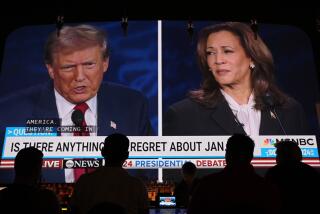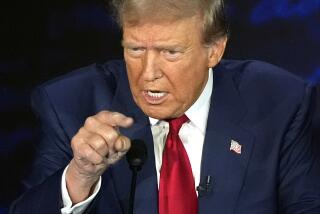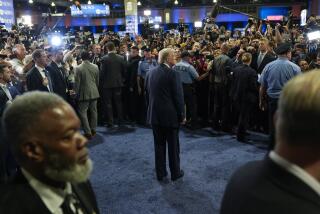Bush’s Winning Glow Dims After Poor Debate Reviews
- Share via
After his less-than-commanding performance in two presidential debates, George W. Bush faces a tougher race than expected amid growing signs of Republican discontent--including a new poll that shows major slippage in the key primary state of New Hampshire.
While the Texas governor remains a heavy favorite for the GOP nomination, his problems were underscored by an independent survey Wednesday showing Sen. John McCain of Arizona surging past Bush to his biggest lead ever, 37% to 30%. The result represented a shift of 10 percentage points from a New Hampshire survey in mid-November.
“In the debates Bush offered up the same canned responses the people of New Hampshire have heard for the past six to eight weeks,” said Dick Bennett, a nonpartisan New Hampshire pollster who conducted the survey of 600 likely Republican voters. “You could have put a TV and VCR up on the stage and played his ads because that’s how he answered every question.”
Image of Uncertainty, Rehearsed Responses
For Bush, more troublesome than sagging poll numbers may be his failure to dispel questions about his intellect and preparedness for the White House. To many, Bush came across in the debates as uncertain, propped up by rehearsed responses and a series of stilted talking points.
If that image takes hold, Bush could face the same kind of burden that plagued former Vice President Dan Quayle, to whom he is being increasingly compared.
“He gets the deer-in-the-headlight look that Quayle used to get,” said Fred Davis, a GOP media strategist and former Quayle advisor, who feels both men are smarter and more appealing than their critics suggest. “You almost see his brain trying to remember what he was told, and Quayle came across that way.”
Some criticism is to be expected, especially from rivals keen to undercut Bush and pierce his aura of inevitability. But even supporters have expressed concern about his performances, which gave voters their widest exposure yet to a front-runner who has campaigned mostly in scripted settings.
“We’ve seen two performances where he is not meeting the expectations that the political community has for him as their leader who was going to take them to the promised land,” said one Republican strategist close to the Bush campaign. “If he doesn’t improve markedly, especially vis-a-vis McCain, he’s looking at a much more competitive race than he ever planned on.”
Looking past the primaries, some Republicans voiced concern over how Bush, as the GOP nominee, might fare in a fall debate against Vice President Al Gore or former New Jersey Sen. Bill Bradley, both far more experienced in such settings.
‘Could Be a Real Disaster’
“Each debate you hope the candidate gets a little better,” said a GOP consultant who played a prominent role in the last presidential race. “If Bush doesn’t improve, it could be a real disaster.”
For his part, chief campaign strategist Karl Rove insisted he was delighted with Bush’s performance, especially given the “slings and arrows” that he faces by running at the head of the pack. In a general election debate, he said, “there will be a sharper--I’m sure--blunter, different set of exchanges than you’ll see in the primary.”
Still, as the campaign moves closer to the opening bill--the Iowa caucuses and New Hampshire primary, now less than two months off--Bush is facing closer scrutiny.
Everything from his facial expressions--is that a confident smile or an arrogant smirk?--to his Texas twang have come under painstaking examination since the first debate a week ago. “We’re in the season where everything goes under the electron microscope,” lamented an aide to one Western governor, a Bush supporter who admitted to fretting about the governor’s “shaky” showing in his first two debates.
Among political insiders--the people whose obsessive interest shapes the conventional wisdom that gets writ large--two scenes from Monday night’s debate have played over and over the last few days. The first was when Bush was asked to describe the lessons he learned from reading a biography of former Secretary of State Dean Acheson. He replied with a rote recitation of standard lines from his foreign policy stump speech that offered no insights into Acheson’s principles.
In the second instance, he was asked by rival Steve Forbes about steps he would take to reverse the recent spike in oil prices in time for winter. Bush’s proposal encouraging further exploration was at best a long-term solution.
“The first two debates are symptomatic of the weaknesses of the Bush campaign,” said Bill Dal Col, Forbes’ chief strategist. “He comes across as canned and scripted, and when you take away the script, at best he looks lost.”
Not everyone found fault with Bush or his answers in the debate. There were certainly no signs of erosion in the governor’s solid support among members of Congress, his fellow Republican governors or other party leaders who have made Bush the overwhelming favorite of the GOP establishment. Some supporters went out of their way to praise Bush, even calling reporters to offer their unsolicited reviews.
“One guy’s ‘being scripted’ is another’s ‘staying on message,’ ” said Rep. David Dreier (R-San Dimas). “The fact that he is ‘staying on message’ to try to make his points is a plus, not a minus.”
Some more neutral observers are also sympathetic. David Carney, a Republican strategist who’s sitting out the GOP contest, suggests that Bush’s rivals--lacking any strong ideological differences with the governor--have been forced to grasp for some point of contrast.
“This is sort of the fourth generation of front-runner-itis he’s suffered through,” said Carney. “First it was that he was hiding in Austin and not campaigning. Then it was all he cared about was money. Then it was ‘he’s afraid to debate.’ Now it’s that he’s not substantive enough. I don’t know if it’s all just wishful thinking on the part of his opponents or something more.”
Who actually “won” the debates is itself a debatable proposition. But most observers bestow that honor on McCain and agree that Bush has been the biggest loser in the deluge of spin, interpretation and analysis that followed.
The latest New Hampshire poll, showing Bush’s decline and McCain’s lead outside the margin of error for the first time, was conducted from Friday to Tuesday, over the five-day period when the debates took place and the candidates’ performances were assessed. And that scrutiny can affect public opinion even more than the debate itself, as history illustrates.
Back in 1976, most people thought President Ford had bested Jimmy Carter in their San Francisco debate. It was only after analysts pointed out Ford’s blooper--insisting Poland was free of Communist control--that public opinion turned.
At the very least, after months of stasis, the dynamic of the GOP contest has changed significantly in the aftermath of the two televised confrontations. No longer is Bush--with his commanding edge in terms of money and endorsements--threatening to run away virtually uncontested with the nomination. His next test, which promises to be even sterner, comes at the Monday night debate in Iowa.
“Seven days ago, the Bush people believed all they had to do was survive the debates,” said a strategist for one GOP rival. “But after Bush’s performance in the first two, now he’s got an onus to show that he can do more than just survive the next one.”
Times staff writer Nick Anderson in Washington contributed to this story.
More to Read
Get the L.A. Times Politics newsletter
Deeply reported insights into legislation, politics and policy from Sacramento, Washington and beyond. In your inbox twice per week.
You may occasionally receive promotional content from the Los Angeles Times.











